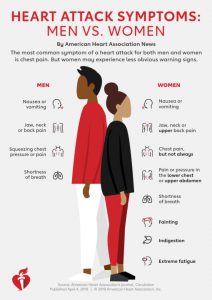Today is a good day to “be in the red.” That’s because it’s National Wear Red Day®, an initiative by the American Heart Association to raise awareness on the importance of heart health. AHA also promotes American Heart Month as a reminder for everyone – especially older Americans and seniors – to have their blood pressure and cholesterol checked regularly, and to make any necessary lifestyle changes that guard against heart disease and stroke. Heart disease and stroke are leading causes of death for both men and women in the U.S. Researchers point to cardiovascular disease (the catch-all phrase for all diseases of the heart and blood vessels) as the underlying cause of death in 1 out of 3 people.
It’s easy to forget just how much our hearts are asked to do. According to Harvard Health, the heart beats about 2.5 billion times over an average lifespan. The flow of blood through the body carries not only oxygen and fuel, but also hormones and essential cells, and takes away the waste products of metabolism. “It’s a wonder it performs so well, for so long, for so many people,” states Harvard Health, “but it can also fail, brought down by a poor diet and lack of exercise, smoking, infection, unlucky genes, and more.”
The importance of knowing your risk factors for developing heart disease cannot be understated, as Susan Lucci learned. At age 71, the petite, fit and active actress best known for playing Erica Kane on “All My Children,” received two stents to open two blocked arteries – one closed 70%, the other 90%. Despite following a healthy diet and regularly exercising, Ms. Lucci was challenged by this strong risk factor: a family history of heart disease. Her father developed arteriosclerosis and suffered a heart attack in his 40s. If you have a family history of heart disease, it’s advisable to talk to your medical professional about the various tests that are used to diagnose heart disease.
Men and Women Experience Heart Attack Symptoms Differently

The good news is that it’s never too late or too early to improve your heart health. Small changes like committing to a healthy diet and regular exercise can help get your blood pressure and cholesterol numbers within a healthy range. Bigger changes like losing weight if you’re BMI (body mass index) is high and quitting smoking will provide more positive health benefits.
Habits for Keeping Your Heart Healthy

A trained and knowledgeable Amada caregiver can help support a senior patient in protecting their overall health, or if needed, managing symptoms of CHF (congestive heart failure). With their training, an Amada caregiver can differentiate between clear signs of CHF and anxiety that might cause an unnecessary hospital visit. Please know that Amada Senior Care is here for you to provide answers and offer specific assistance. Feel free to call us at 877-442-6232 or email us at info@AmadaSeniorCare.com.















